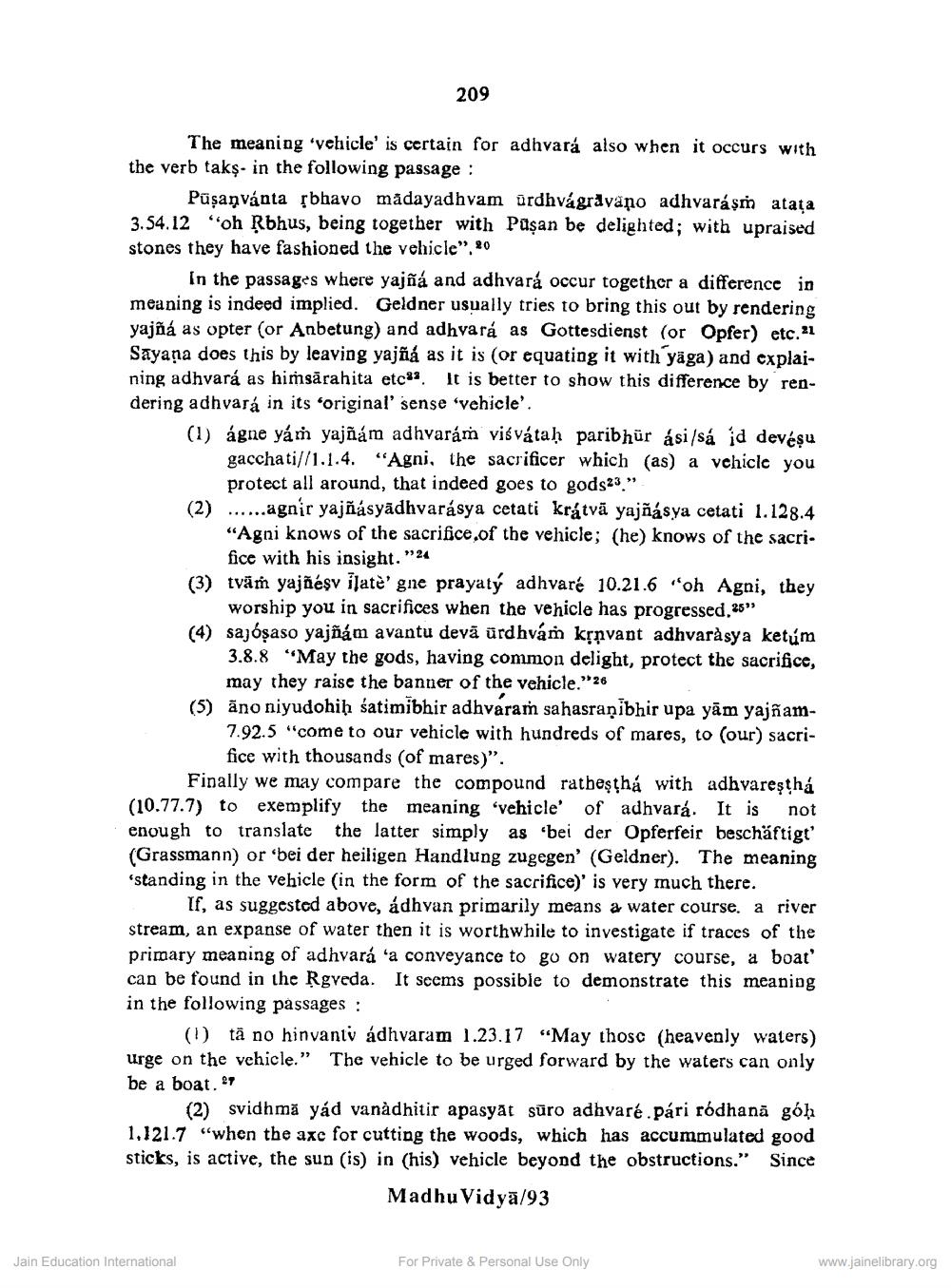________________
209
The meaning 'vehicle' is certain for adhvará also when it occurs with the verb takş- in the following passage :
Pūṣaṇvánta sbhavo madayadhvam urdhvágrivano adhvaráşm atata 3.54.12 "oh Röhus, being together with Puşan be delighted; with upraised stones they have fashioned the vehicle". 20
in the passages where yajñá and adhvará occur together a difference in meaning is indeed implied. Geldner usually tries to bring this out by rendering yajñá as opter (or Anbetung) and adhvará as Gottesdienst (or Opfer) etc. 21 Sayaņa does this by leaving yajñá as it is (or equating it with yäga) and explaining adhvará as himsārahita etc. It is better to show this difference by rendering adhvará in its original sense 'vehicle'.
(1) ágne yar yajñám adhvaram visvátaḥ paribhür ási/sá id devéşu
gacchati//1.1.4. “Agni, the sacrificer which (as) a vehicle you protect all around, that indeed goes to gods23." ......agnir yajñasyadhvarásya cetati krátvā yajñásya cetati 1.128.4 “Agni knows of the sacrifice.of the vehicle; (he) knows of the sacri
fice with his insight.”24 (3) tvāṁ yajñéşv ilatè' gne prayaty adhvaré 10.21.6 "oh Agni, they
worship you in sacrifices when the vehicle has progressed,25" (4) sajóșaso yajõám avantu devā ürd hvám krpvant adhvaràsya ketum
3.8.8 "May the gods, having common delight, protect the sacrifice,
may they raise the banner of the vehicle."26 (5) ano niyudohiḥ śatimibhir adhvaraṁ sahasranibhir upa yām yajñam
7.92.5 "come to our vehicle with hundreds of mares, to (our) sacri
fice with thousands (of mares)".
Finally we may compare the compound ratbeşthá with adhvareşthá (10.77.7) to exemplify the meaning vehicle' of adhvara. It is not enough to translate the latter simply as bei der Opferfeir beschäftigt' (Grassmann) or bei der heiligen Handlung zugegen' (Geldner). The meaning 'standing in the vehicle (in the form of the sacrifice)' is very much there.
If, as suggested above, ádhvan primarily means a water course. a river stream, an expanse of water then it is worthwhile to investigate if traces of the primary meaning of adhvará 'a conveyance to go on watery course, a boat' can be found in the Rgveda. It seems possible to demonstrate this meaning in the following passages :
(1) tā no hinvantv ádhvaram 1.23.17 "May thosc (heavenly waters) urge on the vehicle.” The vehicle to be urged forward by the waters can only be a boat. 27
(2) svidhma yád vanàdhitir apasyāt sūro adhvaré pári ródhanā góh 1.121.7 “when the axe for cutting the woods, which has accummulated good sticks, is active, the sun (is) in (his) vehicle beyond the obstructions." Since
Madhu Vidya/93
Jain Education International
For Private & Personal Use Only
www.jainelibrary.org




